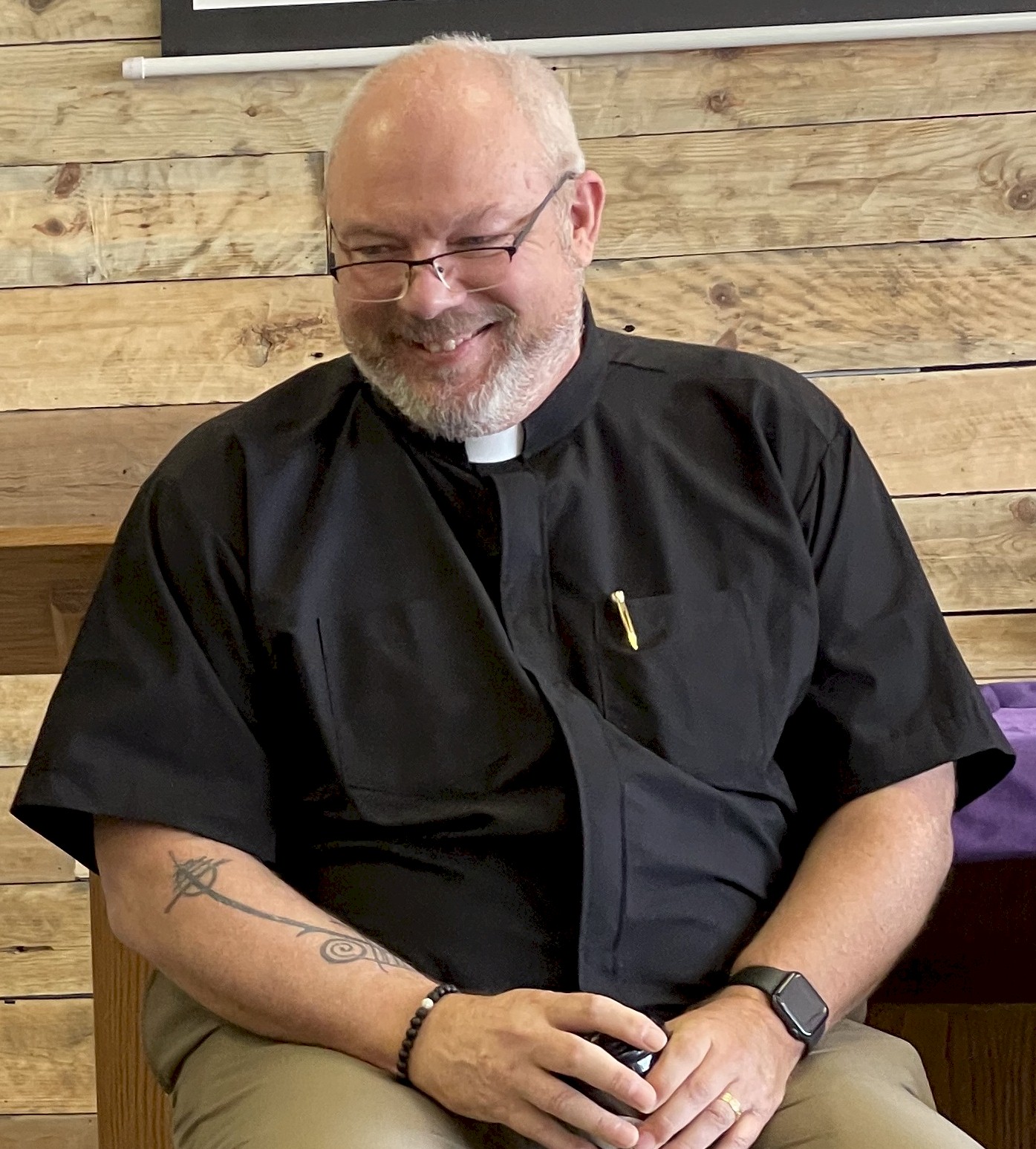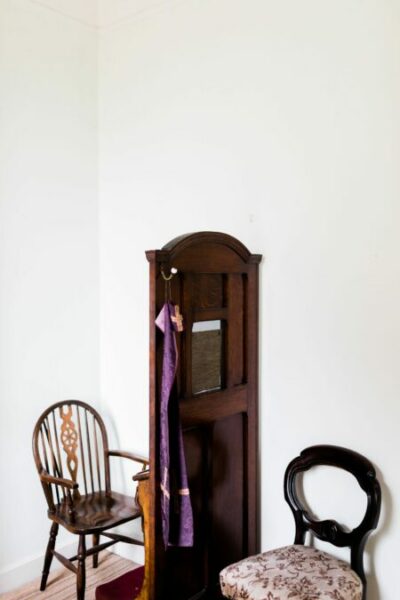The following is the personal sacramental exploration and expression of one individual. The expressed view does not necessarily represent the views or teaching of any current or future institution with whom the writer may be associated.
The Problem

I’ve never been a fan of something I always referred to as “Bacon Strips Theology”. The whole – “whip me, beat me, take away my charge card”1Tish, Space Camp, 1986 (“Space Camp Quotes.” Quotes.net. STANDS4 LLC, 2022. Web. 27 Jan. 2022. https://www.quotes.net/mquote/89132.) thing truly has no place in the church given the healing and salvific mission in which our +Christ engaged so many years ago. Yes, we err and are prone to making wrong choices in life. Yes, we hate and engage in war. We do other things, too, that prevent us from incorporating the +Creator’s love into our lives. But the teachings on sin are outdated as is the path to overcoming sin. “Whip me, beat me” must be replaced with a “you are healed” mentality.
From the trauma-informed lens, focusing on sin rather than salvation promotes a negative stigma of the confessional and further’s the rift between heaven and humanity. But it needn’t be that way. It’s time to revise the Sacrament of Penance (reconciliation) and perhaps even reincorporate it into a Sacrament of Healing. That is, after all, what our +Christ intended when +He healed the paralytic in Matthew 9. 2Matthew 9:1-8: Jesus Heals a Paralytic: 2 And just then some people were carrying a paralyzed man lying on a bed. When Jesus saw their faith, he said to the paralytic, “Take heart, son; your sins are forgiven.” 3 Then some of the scribes said to themselves, “This man is blaspheming.” 4 But Jesus, perceiving their thoughts, said, “Why do you think evil in your hearts? 5 For which is easier, to say, ‘Your sins are forgiven,’ or to say, ‘Stand up and walk’? 6 But so that you may know that the Son of Man has authority on earth to forgive sins”—he then said to the paralytic—“Stand up, take your bed and go to your home.” 7 And he stood up and went to his home. 8 When the crowds saw it, they were filled with awe, and they glorified God… (https://www.biblegateway.com/passage/?search=Matthew+9&version=NRSVCE)
We are sitting on the precipice – engaging in a delicate balance of light and dark – and now have an opportunity to truly transform ministry for a new age. It’s time to turn away from self-flagellation and return to the healing our +Creator offered through the life, ministry, death, and Resurrection of the +Great +Healer – Jesus.
A Quick History of How We Got Here…
Throughout the New Testament, Christians are reminded to confess sins and pray for forgiveness; which is often paired with some description of receiving healing. James 5:13-15 is one such example.3 The Prayer of Faith: 13 Are any among you suffering? They should pray. Are any cheerful? They should sing songs of praise. 14 Are any among you sick? They should call for the elders of the church and have them pray over them, anointing them with oil in the name of the Lord. 15 The prayer of faith will save the sick, and the Lord will raise them up; and anyone who has committed sins will be forgiven. (https://www.biblegateway.com/passage/?search=James+5&version=NRSVCE) 4Martos, Joseph. Doors to the Sacred. Ligouri. 2014. There are many such examples scattered throughout both the Hebrew and Christian scriptures where healing and the forgiveness of sins are connected. 5Ibid
Early Church leaders adopted the understanding that the power of forgiving and retaining sins was communicated to the Apostles and their successors by the conveyance of the Holy Spirit after Jesus’ resurrection. Hanna, Edward. “The Sacrament of Penance.” The Catholic Encyclopedia. Vol. 11. New York: Robert Appleton Company, 1911. 27 Jan. 2022 http://www.newadvent.org/cathen/11618c.htm. In the tradition of the early Church, the words of the +Christ are not of a judge, but of the kindness of a father who weeps with a repentant child Ibid Aphraates, “Ep. de Poenitentia”, dem. 7 and of the physician who heals the wounds of the soul. Origen in P.G., XII, 418; P.L., XII, 1086 However, at some point the church moved away from the Church as a healer to the Church as forgiver of sins, with a severe emphasis on the human condition being one that is naturally sinful. Before the 4th century, Original Sin did not exist as it was widely believed children were born without sin and created in the image of the +God. Over time, the concept of Original Sin developed along with a literalistic interpretation of the Creation myths (Genesis 1 & 2), and by the 16th century, the Church developed the position that children were born with free will and were, therefore, able to sin. 6Perry, John M. Exploring the Genesis Creation and Fall Stories. Sheed & Ward, 1992.
Throughout the years of theological development and argument on the nature of humankind, Church leaders used the Creation myths as the basis of their understanding of the “sinful nature of [humanity]”.7Ibid Today we know the Creation stories are myths – developed because two priests wanted to teach their respective kings valuable lessons on right and wrong. 8Ibid Again, it is time we move away from the literalistic view and return to a healing-based theology (not sin-based) that Jesus exemplified throughout +His life.
A New Confessional
Throughout my formal Catholic education, I have never been fond of the confessional. The idea that I had to sit behind a screen recalling everything I’d done wrong in the past week was, at best, challenging given the strict nature of my father’s house. Worse was the forced self-deprecation in which I had to engage every Sunday morning so I could serve on the altar. Suddenly little things became insurmountable mountains. Finally, after what seemed like eons of spewing absolute nonsense, the priest would invariably say in his thick Irish brogue – “Aw Kenny, you’d better be good or the +Father won’t look kindly on you.” He would then subject me to the usual two decades while focusing on the hurt I’ve caused the +Father’s heart. Ultimately, though, I was forgiven my sins so long as I completed my penance. Looking back I realize how traumatizing it is to a young person to make them believe they have done damage to their +God.
Today we have a different interpretation of sin – “It means to not hit the target. You aim for a spot and miss it.”9Sayers, Brian. “What Is Sin?” Association of Certified Biblical Counselors, 2020, https://biblicalcounseling.com/resource-library/articles/what-is-sin/. It is not banishment from the +Divine; the +Creator can no more separate +Itself from us than we can remove our own heart and still live. However, we can and do deny the +One’s entry into our hearts and lives – a sort of personal banishment of ourselves from our +Beloved. In that way, it may at times feel as if we are utterly lost and alone but we’re not.

For ages, we used the confessional as a way back to the +Creator – but instead, it became a way of ensuring we remained complacent and in the pews. It should have been used as a tool to clear the obstacles we create so we can finally see that we have never strayed from the presence of our +Beloved. +They have always been by our sides – through thick and thin.
Instead of a place of atonement, the confessional needs to become a place where we can discover how to maintain an ongoing relationship with the +Creator where we can find peace and comfort, as well as forgiveness and healing. Priests would be better off engaging in spiritual direction with forgiveness freely given so long as the penitent asks. It should be a place of respite and reflection, not self-condemnation.
It should be a sacrament of Joy!
A New Way
In the old days, we used to say, “Bless me, Father, for I have sinned. It is [state the length of time] since my last confession.” Instead say, “Heal me, Father/Mother, for I need help finding my +Beloved. I stumbled on the path and need help finding my way.” Turn the confessional into an exercise in mindfulness. Let it become a conversation on how to avoid wrong-doing. Let it become a celebration of letting the heart and mind find stillness and the +Creator’s voice in all things.
Do not list your sins, instead discover what keeps you doing the same thing time after time. Discover what prevents you from finding the +Creator in everything around you – in all you do and in everyone you meet. Find a way to connect with your own heart and forgive yourself for anything you’ve done to harm yourself or those around you.
Remember, also, to turn your eyes to the teachings of the +Christ – become like the +Christ and love even those who harm you. Find your way back to the path and heal your mind, body, and soul.
Blessings+
Notes & Citations
- 1Tish, Space Camp, 1986 (“Space Camp Quotes.” Quotes.net. STANDS4 LLC, 2022. Web. 27 Jan. 2022. https://www.quotes.net/mquote/89132.)
- 2Matthew 9:1-8: Jesus Heals a Paralytic: 2 And just then some people were carrying a paralyzed man lying on a bed. When Jesus saw their faith, he said to the paralytic, “Take heart, son; your sins are forgiven.” 3 Then some of the scribes said to themselves, “This man is blaspheming.” 4 But Jesus, perceiving their thoughts, said, “Why do you think evil in your hearts? 5 For which is easier, to say, ‘Your sins are forgiven,’ or to say, ‘Stand up and walk’? 6 But so that you may know that the Son of Man has authority on earth to forgive sins”—he then said to the paralytic—“Stand up, take your bed and go to your home.” 7 And he stood up and went to his home. 8 When the crowds saw it, they were filled with awe, and they glorified God… (https://www.biblegateway.com/passage/?search=Matthew+9&version=NRSVCE)
- 3The Prayer of Faith: 13 Are any among you suffering? They should pray. Are any cheerful? They should sing songs of praise. 14 Are any among you sick? They should call for the elders of the church and have them pray over them, anointing them with oil in the name of the Lord. 15 The prayer of faith will save the sick, and the Lord will raise them up; and anyone who has committed sins will be forgiven. (https://www.biblegateway.com/passage/?search=James+5&version=NRSVCE)
- 4Martos, Joseph. Doors to the Sacred. Ligouri. 2014.
- 5Ibid
- 6Perry, John M. Exploring the Genesis Creation and Fall Stories. Sheed & Ward, 1992.
- 7Ibid
- 8Ibid
- 9Sayers, Brian. “What Is Sin?” Association of Certified Biblical Counselors, 2020, https://biblicalcounseling.com/resource-library/articles/what-is-sin/.

